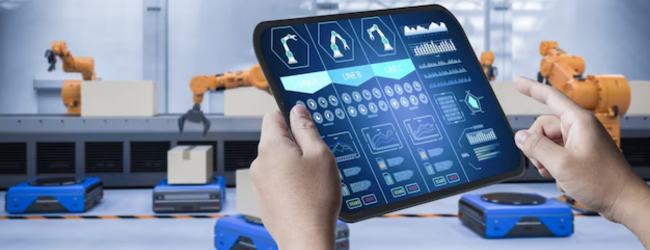Table of contents
- 1. Eco-Friendly Packaging Materials
- 2. 3D-Printed Customized Products
- 3. Smart Home Devices Manufacturing
- 4. Specialized Medical Equipment
- 5. Sustainable Construction Materials
- 6. Electric Vehicle Components
- 7. Personalized Nutritional Supplements
- 8. Advanced Agricultural Equipment
- 9. Specialized Industrial Robotics
- 10. Advanced Textile Manufacturing
- Conclusion
- Frequently Asked Questions (FAQs)
The manufacturing sector is evolving rapidly, driven by technological advancements and changing consumer demands. If you’re looking to start a business in 2025, manufacturing offers numerous lucrative opportunities. This article presents 10 of the best manufacturing business ideas with high potential for success.
10 Best Manufacturing Business Ideas
1. Eco-Friendly Packaging Materials

Produce biodegradable and sustainable packaging materials to replace traditional plastics.
a. Why this Idea: Growing environmental awareness and regulations are driving demand for eco-friendly packaging.
b. Licenses Required: Environmental permits, business licenses, and potentially food-grade certifications.
c. Investment Required: Moderate to high, depending on the scale and technology used.
d. How to Sell: Partner with food companies, e-commerce businesses, and retailers. Online marketplaces and direct sales are also viable.
e. Any other Requirements: Sourcing sustainable raw materials, quality control, and adherence to environmental standards.
f. Challenges in the Idea: Competition from established plastic manufacturers, cost of raw materials, and developing effective biodegradable materials.
g. How to overcome the Challenges: Focus on niche markets, invest in R&D, and build strong relationships with suppliers.
Example: A company specializing in manufacturing packaging from seaweed and mushroom-based materials, offering customized shapes and sizes for different products.
2. 3D-Printed Customized Products

Create customized products using 3D printing technology, catering to individual needs and preferences.
a. Why this Idea: 3D printing allows for rapid prototyping and on-demand manufacturing, opening up possibilities for personalized products.
b. Licenses Required: Business licenses and potentially intellectual property protection for unique designs.
c. Investment Required: Moderate, primarily for 3D printers and design software.
d. How to Sell: Online platforms, custom order websites, and collaborations with designers and artists.
e. Any other Requirements: Design skills, knowledge of 3D printing materials, and quality control.
f. Challenges in the Idea: High initial equipment cost, competition from online 3D printing services, and maintaining consistent quality.
g. How to overcome the Challenges: Focus on niche markets, offer unique designs, and invest in high-quality printers.
Example: A business specializing in 3D-printed custom prosthetics for animals, providing personalized solutions based on individual animal anatomy.
ALSO READ | Start an Online Marketing Home based Business : Step-by-Step Guide for 2025
3. Smart Home Devices Manufacturing

Produce innovative smart home devices that enhance convenience and efficiency.
a. Why this Idea: The smart home market is booming, with increasing demand for connected devices.
b. Licenses Required: Electrical safety certifications, business licenses, and potentially software licenses.
c. Investment Required: High, especially for R&D and manufacturing equipment.
d. How to Sell: Online marketplaces, partnerships with home improvement retailers, and direct sales through a website.
e. Any other Requirements: Software development skills, knowledge of IoT technology, and quality control.
f. Challenges in the Idea: Rapid technological changes, competition from established tech companies, and ensuring compatibility with existing smart home ecosystems.
g. How to overcome the Challenges: Focus on niche applications, invest in R&D, and build strong partnerships with tech companies.
Example: A company that manufactures smart, self-cleaning hydroponic systems for home use, with integrated AI for optimal plant growth.
💡 Pro Tip: If you want to start a Manufacturing Business but have too many doubts, connect with a Manufacturing Business expert from Boss Wallah for guidance – https://bw1.in/1116
4. Specialized Medical Equipment

Manufacture specialized medical equipment, catering to specific medical needs.
a. Why this Idea: The healthcare sector is constantly evolving, creating demand for specialized medical devices.
b. Licenses Required: FDA approvals, medical device certifications, and business licenses.
c. Investment Required: High, due to strict regulatory requirements and advanced manufacturing processes.
d. How to Sell: Direct sales to hospitals and clinics, partnerships with medical distributors, and online medical supply platforms.
e. Any other Requirements: Medical expertise, quality control, and adherence to regulatory standards.
f. Challenges in the Idea: Strict regulatory requirements, high R&D costs, and competition from established medical device manufacturers.
g. How to overcome the Challenges: Focus on niche medical applications, build strong relationships with medical professionals, and invest in quality assurance.
Example: A company manufacturing custom-fitted orthopedic braces using advanced scanning and 3D printing technologies.
5. Sustainable Construction Materials

Produce sustainable construction materials that reduce environmental impact.
a. Why this Idea: The construction industry is increasingly focused on sustainability, driving demand for eco-friendly materials.
b. Licenses Required: Construction material certifications, environmental permits, and business licenses.
c. Investment Required: Moderate to high, depending on the materials and manufacturing processes.
d. How to Sell: Partnerships with construction companies, building material retailers, and direct sales.
e. Any other Requirements: Knowledge of sustainable materials, quality control, and adherence to building codes.
f. Challenges in the Idea: Competition from traditional construction materials, cost of sustainable materials, and ensuring durability and performance.
g. How to overcome the Challenges: Focus on niche applications, educate consumers about the benefits of sustainable materials, and invest in R&D.
Example: A company that produces building blocks made from recycled plastic and agricultural waste, offering high thermal insulation and structural integrity.
6. Electric Vehicle Components

Manufacture components for electric vehicles (EVs), capitalizing on the growing EV market.
a. Why this Idea: The EV market is experiencing rapid growth, creating demand for components like batteries, motors, and charging systems.
b. Licenses Required: Automotive component certifications, electrical safety certifications, and business licenses.
c. Investment Required: High, especially for R&D and manufacturing equipment.
d. How to Sell: Partnerships with EV manufacturers, automotive component distributors, and online platforms.
e. Any other Requirements: Engineering expertise, knowledge of EV technology, and quality control.
f. Challenges in the Idea: Rapid technological changes, competition from established automotive suppliers, and ensuring component reliability.
g. How to overcome the Challenges: Focus on niche components, invest in R&D, and build strong partnerships with EV manufacturers.
Example: A company that manufactures lightweight, high-capacity battery modules for electric motorcycles and scooters.
ALSO READ | Start Home-Based Online Tutoring Business: Guaranteed Success in 10 Easy Steps
7. Personalized Nutritional Supplements

Produce personalized nutritional supplements based on individual health needs and genetic profiles.
a. Why this Idea: The personalized nutrition market is growing, with consumers seeking customized health solutions.
b. Licenses Required: Food supplement certifications, GMP (Good Manufacturing Practice) certifications, and business licenses.
c. Investment Required: Moderate to high, depending on the scale and technology used.
d. How to Sell: Online platforms, partnerships with health and wellness professionals, and direct sales.
e. Any other Requirements: Nutritional expertise, genetic testing capabilities, and quality control.
f. Challenges in the Idea: Ensuring product safety and efficacy, complying with regulations, and building consumer trust.
g. How to overcome the Challenges: Partner with reputable health professionals, invest in quality testing, and build strong brand trust.
Example: A company that manufactures personalized vitamin packs based on DNA analysis and lifestyle questionnaires.
8. Advanced Agricultural Equipment

Manufacture advanced agricultural equipment that enhances efficiency and sustainability.
a. Why this Idea: The agricultural sector is increasingly adopting technology to improve productivity and reduce environmental impact.
b. Licenses Required: Agricultural equipment certifications, safety certifications, and business licenses.
c. Investment Required: High, especially for R&D and manufacturing equipment.
d. How to Sell: Partnerships with agricultural equipment distributors, direct sales to farmers, and online platforms.
e. Any other Requirements: Engineering expertise, knowledge of agricultural technology, and quality control.
f. Challenges in the Idea: Competition from established agricultural equipment manufacturers, ensuring equipment reliability in harsh conditions, and adapting to changing
g. How to overcome the Challenges: Focus on niche equipment needs, develop robust and reliable designs, and maintain close relationships with farmers to understand their evolving requirements.
Example: A company that manufactures precision drone-based spraying systems that use AI to identify and target weeds, reducing pesticide usage and improving crop yields. This system could also include soil and crop health analysis, that can be done from the drone, and reported back to the farmer.
9. Specialized Industrial Robotics

Develop and manufacture specialized industrial robots for specific applications.
a. Why this Idea: Automation is increasing across industries, driving demand for specialized robotic solutions.
b. Licenses Required: Industrial safety certifications, software licenses, and business licenses.
c. Investment Required: High, especially for R&D, software development, and manufacturing equipment.
d. How to Sell: Direct sales to industrial companies, partnerships with automation integrators, and online industrial marketplaces.
e. Any other Requirements: Engineering expertise, software development skills, and knowledge of industrial processes.
f. Challenges in the Idea: High R&D costs, competition from established robotics companies, and ensuring robot reliability and safety.
g. How to overcome the Challenges: Focus on niche applications, build strong relationships with industrial clients, and invest in robust testing and quality control.
Example: A company that manufactures robots designed for precision welding in aerospace manufacturing, equipped with advanced sensors and AI for optimal performance.
10. Advanced Textile Manufacturing

Produce advanced textiles with specialized properties, such as smart textiles or high-performance materials.
a. Why this Idea: The textile industry is evolving, with demand for innovative materials in various applications.
b. Licenses Required: Textile certifications, safety certifications, and business licenses.
c. Investment Required: Moderate to high, depending on the textile technology and manufacturing processes.
d. How to Sell: Partnerships with fashion brands, sportswear companies, and industrial textile distributors, and direct sales.
e. Any other Requirements: Textile engineering expertise, knowledge of advanced materials, and quality control.
f. Challenges in the Idea: Competition from established textile manufacturers, high R&D costs for innovative materials, and ensuring consistent quality and performance.
g. How to overcome the Challenges: Focus on niche applications, partner with research institutions, and invest in advanced manufacturing technologies.
Example: A company that manufactures smart textiles with integrated sensors for monitoring vital signs in athletic wear, providing real-time performance data.
Need Expert Guidance?
Starting a business can be challenging, but you don’t have to do it alone! At Boss Wallah, our 2,000+ business experts are ready to provide valuable insights and guidance. Whether you need help with marketing, finance, sourcing, or any other area of any business, our business experts are here to help you succeed- https://bw1.in/1116
Confused about Which Business to Start?
Want to start your own business but unsure which one to choose? Explore Boss Wallah, where you’ll find 500+ courses by successful business owners, featuring practical, step-by-step guides on starting and growing various businesses.Find your perfect business idea today – https://bw1.in/1111
Conclusion
The manufacturing sector presents numerous opportunities for entrepreneurs in 2025. By focusing on innovative and sustainable solutions, you can create a successful and impactful business. Thorough research, careful planning, and a commitment to quality are essential for navigating the challenges and capitalizing on the potential of these manufacturing business ideas.
Frequently Asked Questions (FAQs)
1. What are the key factors to consider when starting a manufacturing business?
- Market demand, investment requirements, licensing and regulations, sourcing raw materials, and production processes.
2. How do I determine the feasibility of a manufacturing business idea?
- Conduct market research, analyze competition, develop a business plan, and assess financial projections.
3. What licenses and permits are typically required for manufacturing businesses?
- Business licenses, environmental permits, industry-specific certifications, and safety certifications.
4. How can I secure funding for a manufacturing startup?
- Loans, grants, venture capital, angel investors, and crowdfunding.
5. What are the essential steps in developing a manufacturing business plan?
- Executive summary, company description, market analysis, product or service description, marketing and sales strategy, and financial projections.
6. How can I ensure quality control in my manufacturing process?
- Implement quality management systems, conduct regular inspections, and adhere to industry standards.
7. How can I market my manufactured products effectively?
- Online marketing, partnerships with distributors, participation in trade shows, and direct sales.
8. What are the emerging trends in the manufacturing industry?
- Automation, 3D printing, sustainable manufacturing, and personalized products.


